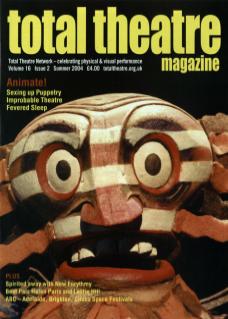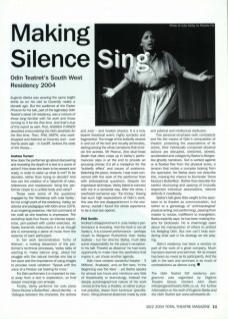Andrea Turner:
How does the performer go about discovering and revealing the depth of a text or a score of action? How does she learn to be present and ready, in order to wake up what is not? To be decided, rather than trying to decide? And how can the creation of a 'labyrinth of rules, references and resistances' bring the performer closer to a unified body and voice?
These were some of the questions engaged by the ‘Workshop with Julia Varley’, for me a high point of the residency. Varley, an actress and pedagogue with Odin since 1976, is an inspiring presence. Her full command of her craft as she teaches is impressive. The workshop lasts four hours; an intense experience, jam-packed with useful exercises. As Varley transmits instructions it is as though she is composing a piece of music from the essence of each participant.
In her work demonstration 'Echo of Silence', a riveting dissection of the performer's technical processes, Varley talks of wanting to ‘make silence sing', about her struggle with the natural tremble she has in her voice and the importance of using images to provoke vocal variation: 'Speak with the voice of a Persian cat looking for mice.’
For Odin performers it is important to travel away from a text in exploration, so that deeper meanings can emerge.
Finally, Varley performs her solo piece Dona Musica's Butterflies, about identity – a 'dialogue between the character, the actress and Julia' – and modern physics. It is a truly bizarre theatrical event, highly symbolic and fragmented. The image of the butterfly weaves in and out of the text and visually dominates, darting among the white carnations that encircle the actress. Mr Peanut (the skull-head Death that often crops up in Varley's performances) slips in at the end to provide an amusing climax: it's all a metaphor for the 'butterfly effect' and issues of existence. Watching the piece, however, I was more concerned with the work of the performer than with philosophical questions. Despite her impressive technique, Varley failed to connect with me in a sensorial way. After the show, I overheard someone say: 'Too tricksy.' Having had such high expectations of Odin's work, this was the one disappointment in the residency; overall I found the whole experience to be a real eye-opener.
Phil Smith:
Andrea's disappointment in Julia Varley's performance is revealing. And the fault is not all Varley's. It is a bizarre performance – perhaps closer to Margaret Rutherford than Varley realises – but her director, Barba, must take some responsibility for the piece's reception. In his talk ‘Theatre as Absence' he had every opportunity to make clear the aesthetics that inspire it, yet chose another agenda.
Odin have created wonderful theatre – Il Millione, Anabasis, and, on film here, In the Beginning was the Idea – yet Barba speaks for almost two hours and mentions very little of theatricality or dramaturgy. Instead the deeply autobiographical nature of his work comes to the fore; a theatre, or rather a physical practice, drawn from luminous 'grandfathers', filling personal absences made by exile and political and intellectual disillusion.
This personal emphasis both contradicts and fits the means of Odin's composition of theatre: protecting the associations of its actors, their individually composed physical actions are disrupted, stretched, slowed, accelerated and collaged by Barba to Borges like ghostly narratives. Text is worked against or is floated free from the physical score, a tension that invites a complex looking from the spectator. Yet Barba does not describe this, missing the chance to illuminate Dona Musica's Butterflies. Rather than describe the careful structuring and spacing of mutually respected individual associations, silence defends it needlessly.
Barba's talk gives little weight to the spectator or to theatre as communication, but rather to a genealogy of anthropological physical acting (not performing), passing from master to novice, indifferent to evangelism. Barba explicitly says: he has been making theatre for Grotowski. He is charmingly open about his manipulation of others to protect his fledgling Odin. But one can't help wondering what part in his strategy we are playing.
Odin's residency has been a window on part of the work of a great company. Much has been learned and admired. Yet its impact has been as mixed as its participants. And the talk in the bars and seminars is as much of contradictions as silence sung.
The Odin Teatret SW residency programme was organised by Organic Theatre Group. Contact John Dean info@organictheatre.fslife.co.uk For further information on the work of Eugenio Barba and the Odin Teatret see www.odinteatret.dk

